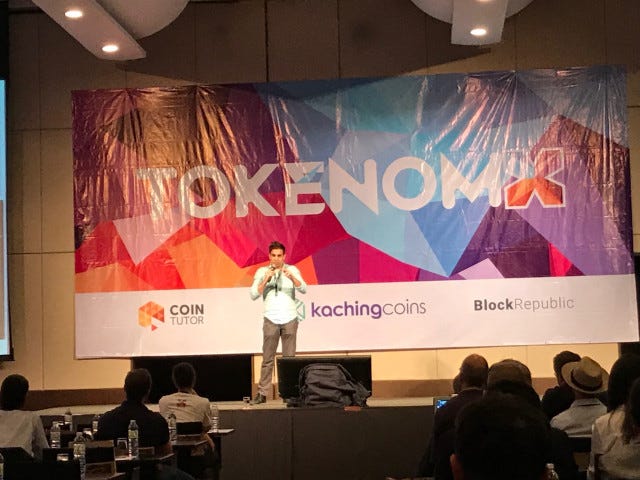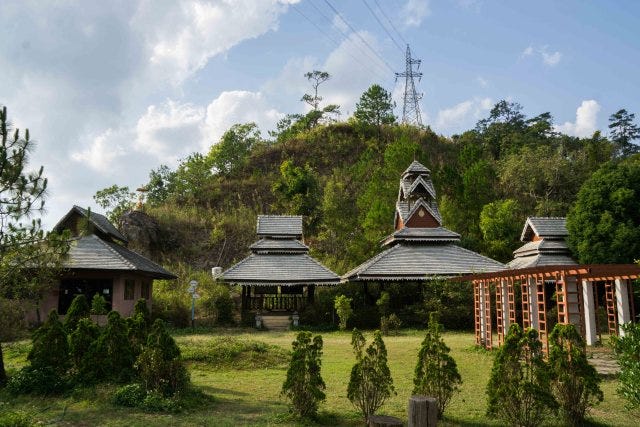By Jeff Wilser (original post here)
Here’s what really happens on a “decentralized vacation” in Chiang Mai
A teenage boy dumps a bucket of ice-cold water on my head, and then another shoots me with a water gun, the kind of plastic rifle that squirts out a steady stream. I’m wet and cold. The teenagers break out laughing and the tuk-tuk driver laughs, too, and it’s clear that this was a set-up.
Welcome to Songkran, Thailand’s New Year’s holiday, which is celebrated by three days of water-gun fights. Shops and restaurants are closed. The streets are half party, half war zone. Everyone — kids, parents, grandparents — sprays each other in this “cleansing ritual” that feels like a slip-and-slide version of The Purge.
It’s a polarizing holiday (the cooler-than-thou roll their eyes, and by some counts, hundreds of people die from moped accidents), and Chiang Mai is a polarizing place. The ancient-yet-modern city, full of Buddhist temples and artisanal coffee shops, has the dubious distinction of being the “Digital Nomad Capital of the World,” as its good weather, expat bubble, and low cost of living (apartments for $400 a month) have lured thousands of digital nomads, and now it has lured me. Some remote workers love Chiang Mai, while many dismiss it as “Nomad 101,” full of scammy peddlers of snake oil.
So it’s no surprise that the city is a natural fit for cryptocurrencies and blockchain. “Chiang Mai used to be all about drop-shipping and affiliate marketing. Now it’s all crypto,” says Dana Garrison, a crypto-advisor and regular in the local scene, who always wears black cat ears and goes by the moniker “Crypto Kitty.”
Proof of Conference
Soon after drying myself off from Songkran, I check out Chiang Mai’s inaugural cryptocurrency conference, Tokenomx. On the first day of the conference, in a hotel ballroom with a few hundred attendees, an internet marketing guru named Gerry Cramer takes the stage, full of energy and showmanship. (Cramer gives presentations on things like, “How to make up to $22,227.45 per day without a product or list.”)
“Everybody stand up!” says Cramer.
We stand up.
“Everybody put your hands in the air!”
We do that too.
“Now everybody shake their booty!”
A few people shake their booty, but only a few.
“Now who wants some money?” At Cramer’s instructions, a few female assistants start throwing wads of cash into the crowd, and now about half the crowd is shaking their booties. (I’m in the back row; my booty remains unshaken.)
It’s an effective, if chilling, demonstration of Chiang Mai’s start-up ethos — a relentless focus on sales and conversion. No leap of imagination is required to see how this can translate to the get-rich-quick world of ICOs.
Cramer later reveals that this was a demonstration of successful online marketing. “Asking you to shake your booty was a pretty big ask,” he says. “But I gave you a series of small asks, warming up to the big one.” He guesses that his conversion went from about 14% to 28%, “And when I started throwing money, about 50% shook their booty for me. That’s the psychology of influence and persuasion,” he pauses dramatically, “and I guarantee that it works online.”
It’s an effective, if chilling, demonstration of Chiang Mai’s start-up ethos — a relentless focus on sales and conversion. No leap of imagination is required to see how this can translate to the get-rich-quick world of ICOs.

At the conference’s VIP party in a villa (of course we’re in a villa), the heads of several Chiang-Mai-based start-ups, huddle around a pool — start-ups like Beach Head (a mix of alternate reality, video games, and cryptocurrency), Nostra (a blockchain-based community prediction project), and Unification (a project with the goal of unifying all of your data in one ecosystem). I later meet a guy who says he’s working on an adult entertainment coin (“Pornhub, but on the blockchain”), aiming to keep pornography from the prudish, prying eyes of regulators.
“Huh,” I say. “How do you ensure things like, you know, everyone is age-of-consent?”
He shoots me a hard look. “Talk to my lawyer.”
Proof of Nip
I thought the crypto scene was big in Bali, but that was just an appetizer. In high season (July and August, November and December) Chiang Mai has four meet-ups a week, including an Advanced Meet-Up on Monday, Beginner Bitcoin Meet-Up on Thursday, and Trader Tuesdays. In my month here, I attend as many as possible.
Many are hosted by Charles Turner at his Western-restaurant Food4Thought, whose walls have both a bitcoin logo and a sign that asks, “Have you had any probiotics lately?” In one Advanced Meet-Up, a few developers give a deep-dive into the inner-workings of the Lightning Network, showing a live data visualization of all the nodes — it looks like a Jackson Pollock painting. A crowd of 80 eats their probiotics-infused food and watches, enthralled.
At Bitcoin for Beginners, a dozen newbies get a lesson on the basics (like how to find the right wallet), while another 30 of the regulars mill about over drinks and talk blockchain, life, and the blurring of the two. “Who needs a white paper?” asks Ryan Milbourne, the founder of Nostra (a blockchain-prediction start-up). Ryan hands out copies of Satoshi Nakamoto’s white paper to the newbies, like a Baptist handing out pamphlets at a church gathering.
Yet the best way to understand the crypto community in Chiang Mai is to learn an elaborate, if wildly inappropriate, inside joke. This takes a bit of set-up. As every crypto-enthusiast knows, the various protocols use different methods to “prove” that a batch of transactions should be added to the blockchain — like Proof of Work, Proof of Stake, or Proof of Authority.
Just as Ethereum bulls predict “The Flippening” (where the market cap of Ethereum overtakes that of bitcoin), the Proof of Nipple group predicts “The Slippening.”
In Chiang Mai there is also a Proof of Nipple. In a Telegram group chat, 68 members (and counting) have taken photos of their nipples and posted them to the chat. “ProofofNipples is the first app which will implement he PONprotocol. It is a fully functional nipple detection and identification app on IOS and Android,” proclaims a website that the group has launched. Roughly 80 percent are men, and their photos show both their nipples and faces. Most of the women’s nipples are anonymous — like a privacy coin. Just as Ethereum bulls predict “The Flippening” (where the market cap of Ethereum overtakes that of bitcoin), the Proof of Nipple group predicts “The Slippening.” They joke about a strategic partnership with Free the Nipple. (And yes, I pulled up my shirt and flashed a little nip.)

Many in the Proof of Nip group attend an advanced class on Tokenomics, where Clayton Roche, a tokenomics consultant, gives a presentation on the smartest way for start-ups to configure their ICOs. (Many in the crowd, such as the founder of Unification, Neyma Jahan, are preparing to do just that.) Until October 2017, Clayton focused on his online jewelry store, and then he suddenly switched gears to become an expert in “token design” for ICOs, as it leveraged his degrees in economics and philosophy, and he sensed that this is “where the energy is.” (And, presumably, the money.)
A similar move was made by Dana, the black kitten-ear-wearing solo-entrepreneur who does things like life coaching, brand consulting, and teaching public speaking classes. In January she sensed that all of the Chiang Mai action was in crypto, so she focused her brand accordingly — and even visually. As usual, Dana is wearing her black kitten-ears.
“Is that your peacock?” I ask.
“It’s a mnemonic. People might forget my name, but they won’t forget the cat ears.”
She now brands herself as The Crypto Kitty, and calls herself a “crypto advisor.”
While the millionaires and blockchain start-ups tend to capture our imagination (or scorn), they are supported by a growing blockchain-ecosystem, and you can see the seeds of it in these Chiang Mai early adopters. There are crypto-recruiters, crypto-branding consultants, crypto-publicists. (And, I suppose, there are plenty of new crypto-journalists.) I saw some of this in Bali, yet here it feels more pronounced — like people are taking more of a conscious effort to take things they were already good at, and then give it a crypto-twist.
Nomads are good at reinventing themselves. Many left their day jobs to move to Thailand, risk it all, and learn things like SEO consulting and drop shipping. So it’s almost inevitable, in a way, that blockchain is swallowing up Chiang Mai — the city is packed with digital nomads, and nomads, by definition, are decentralized.
Proof of Sauna
Erica Blair is a branding consultant. Like the Crypto Kitty, she has tweaked her brand to focus on blockchain.
“We’re going to Pai,” she tells me.
Erica is helping to organize a “decentralized vacation” to the nearby mountain town of Pai, and she invites me to join. She sees the getaway — the decentralized getaway — as a proof of concept, of sorts, of how society could operate in a truly decentralized world. It’s not quite a beta-test for a new civilization, but that’s the vibe. In a Telegram group chat, she throws out some basic guidelines (someone has to) and then invites the community to do as they please.
“Activities: Whatever we want… We’ll probably gallivant to hot springs and mountain vistas as desired. Keeping it loosey goosey. If you’re doing something and want people to join, post it in this thread
Invitees: Whomever you want — just make sure they’re not gonna be bored spending a weekend talking about KYC and ICO’s.”
Everyone is responsible for their own transportation and lodging, just as, in a true blockchain world, you, and not a centralized bank, are responsible for things like your private key and securing your assets.
“This is one of the best invites I’ve ever seen,” one member says in the Telegram chat. “The lack of constraints and limitations couldn’t be more in line with my ethos. Makes me happy to find a group that has the same mentality.”
It works surprisingly well. Some stay in lavish accommodations, some (like me) stay in quaint bungalows that cost $17/night. People chime in on Telegram all weekend, informing each other of ad-hoc dinners and brunches. Around 20 of us gather our mopeds and bike through the lush countryside of Pai, zooming up and down hills, as Erica guides us to hot springs and a sweeping view of the valley.

Just as most decentralized networks, in reality, still have concentrations of power — like how four percent of bitcoin addresses own 95 percent of bitcoin — the leaderless vacation still has its unofficial leaders. Neyma Jahan, the head of Unification, owns a mansion in Pai and hosts dinners and pool parties throughout the weekend. Many of the vacationers work with or for Unification, and there’s a pull of gravity towards Neyma. In the morning he has a whiteboard session with the Unification team; at night he cannonballs into the pool.
Across the pool I spot Erica, who has a towel around her shoulders. She sees me and waves. “I’m headed to the sauna. C’mon.”
I join her and a few others in the sauna. It’s baking.
“The thing is…this shit really can change the world,” someone says, dripping with sweat. Others agree.
“I really believe in decentralization,” says Erica. “I really do.”
As the room somehow gets hotter and I begin to feel dizzy, we talk about what a decentralized civilization would really mean and how, theoretically, society could be restructured. Maybe blockchains could let people decide exactly how their tax dollars should be spent? Maybe blockchains would bring total transparency to politicians? Hell, maybe you wouldn’t even need politicians?
Could a smart contract replace the social contract? Or if that’s too laughably far-fetched, could a smart contract improve the social contract? A smart social contract? It’s an exhilarating thought.
These are the more arresting questions that have long been asked by the original purists in the blockchain space, but the ideas get lost in the “Bitcoin Price is X!” articles. For the first time since college or maybe even (um) high school debate, I think about the philosophical underpinnings of what “society” even means. The sauna gets hotter. Names that I haven’t thought of in years leap into my consciousness: John Locke. Thomas Hobbes. Jeremy Bentham.
In Locke’s “State of Nature,” for example, people voluntarily forfeit some of their rights in exchange for the protection of society, and they elect representatives to make decisions. He called this the Social Contract.
The sauna door opens. We get out, take cold showers, grab beers, and then come back into the sauna.
Could a smart contract replace the social contract? Or if that’s too laughably far-fetched, could a smart contract improve the social contract? A smart social contract? It’s an exhilarating thought.
We needed that Social Contract. We needed governments. Millennia ago, the only way for a mob of people to make decisions, due to technical constraints, was to elect a governing body. You couldn’t get 100,000 people to vote by raising their hands. Yet with the blockchain? For the first time in history, there is (theoretically) a tamper-proof way for millions of people to speak up, find a consensus, and make a collective decision. Could a smart contract replace the social contract? Or if that’s too laughably far-fetched, could a smart contract improve the social contract? A smart social contract? It’s an exhilarating thought.
Again we hop out of the sauna, take more cold showers, grab more beer, and then head back into the sauna. We go another three cycles of sweat, freeze, sweat, freeze, sweat.
Afterward we all hug each other. I know that I’m an interloper — just here for the story and not the long haul — but in the heat of the sauna, the group’s warm vibes and hopeful vision of the future, at least in the moment, feel real.
The moment takes me back to why I was so curious about crypto in the first place. If the end game of blockchain is to simply to shave three percent from a corporation’s database costs, well… I can read about that in Supply Chain Quarterly. The sauna, like Chiang Mai, is full of optimism and dreamers. Reality can be a slog, and sometimes we need to be reminded of the dream.

